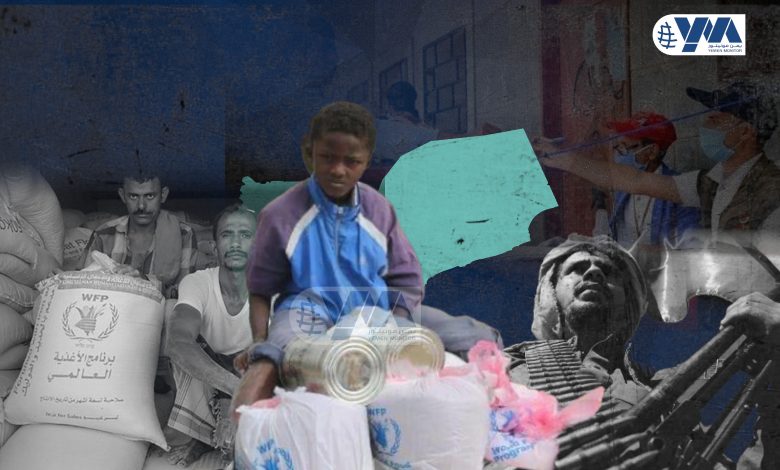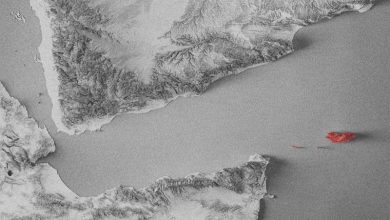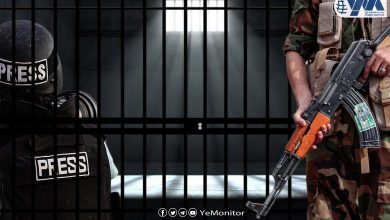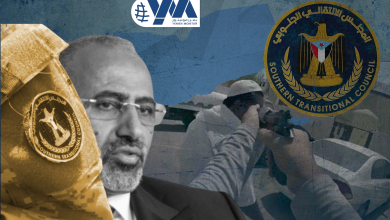
Yemen Monitor/Sanaa/Special:
Last Thursday in Sanaa, Houthi leaders met with the United Nations office and pleaded for the United Nations to redistribute food aid in their areas while famine is spreading.
While this was happening, the Houthis denied the existence of a famine in their areas, considering those rumors to be American and Israeli attempts to undermine their attacks in the Red Sea in support of the Palestinians who are subjected to a brutal war and genocide by the Israeli occupation supported by the West.
On Thursday, the relief official in the group, “Ibrahim Al-Hamli,” demanded during his meeting with the head of the “OCHA” office in Yemen, “Markus Warren,” “to resume the distribution of aid in various sectors to contribute to alleviating humanitarian suffering and preventing the slide towards dangerous stages of suffering and famine.”
The Houthis fear that the worsening famine in their areas will ignite a people’s revolution that has been simmering for years due to the corruption of the group and its failure to manage the provinces under its control, but they continue to blackmail international relief agencies.
Expulsion and Challenge
Last December, the World Food Programme (WFP) in Yemen announced the suspension of its general food assistance program in the Houthi-controlled areas due to the failure to reach an agreement with the authorities to implement a smaller program tailored to the resources available to the most vulnerable and needy families.
According to an informed relief source who spoke to “Yemen Monitor” this week, the group is still negotiating with the WFP to resume aid distribution, as the UN program wants to reach an agreement on a mechanism through which it ensures that aid reaches the deserving instead of the group’s fighters and supporters. The suspension decision resulted in the suspension of food assistance to about 9.5 million people.
The source indicates that the Houthis threatened UN agencies in December that if they did not expel British and American staff, they would close these agencies forever. Therefore, most foreigners, even Europeans, left for Aden, Yemen’s temporary capital. Among those affected is the newly appointed UN Humanitarian Coordinator in Yemen, Julian Harney, who is British.
Since 2019, the Houthis have prevented a biometric system that the UN wants to use to track the flow of aid. Instead, the Houthis insist that the UN and other relief organizations use a quota list prepared by their own administration. This list also serves as a military service record. Families who oppose the Houthis or do not send their children to the front lines have been removed from the quota list, according to a UN report released last year.
Not Satisfied with Expulsion, Houthis Impose Deadline in January, the Houthis went a step further and gave UN and international aid agency staff working in Sana’a a 30-days deadline to leave the country in response to US-British airstrikes on group sites that came in an attempt to deter the Houthis from attacking commercial ships in the Red Sea.
Milking Cow
Since the start of the Houthi attacks in the Red Sea, few outside the country’s borders have noticed the Houthis’ disregard for humanity within. After a decade of war, the UN estimates that the humanitarian crisis in Yemen is one of the worst in the world. More than half of Yemen’s 33 million people need assistance to survive, and many are under Houthi control in the northwest. But across their areas of control, the Houthis are actively impeding the flow of aid.
They insist that the UN use the Houthis’ own beneficiary list and that the Houthis allow supervision of distribution. They have also prevented the arrival of international aid workers. They impose taxes on shipments, sell aid, and impose customs duties on aid at checkpoints.
In short, they treat the multi-billion dollar aid program as a cash cow, says The Economist.
“As in Gaza,” says a former UN official, “the risk of man-made famine is growing in Houthi areas.”
Like the Israelis, “they use aid as a weapon.”
Spies for the West
Relief workers told Yemen Monitor in local organizations this week that the Houthis treat them as spies for the United States and Britain.
An official from a local relief organization operating in Hajjah province, receiving funding for projects from donors in the European Union, mentioned that after the Houthi naval attacks in the Red Sea, the work became more dangerous. “The accusations of us being spies for Europe and European warships have become louder.”
The official told Yemen Monitor that the relief council led by Al-Hamli has become more ruthless in aid distribution than local organizations outside the United Nations: “The Houthis used to turn a blind eye to some of the names and beneficiaries who were supposed to receive aid, but now, with the suspension of the food program and the suffering of their supporters, they impose names, monitor the distribution with armed force, and leave the needy helpless.”
He indicated that the Relief Council “SkSHMA” has escalated its blackmail tactics, threatening us with a choice between distributing aid to the group’s supporters or imprisonment with the charge ready: “Spy for Europe!” This is a charge that leads to execution.
Woe to Those Who Complain
An aid worker in Sana’a says they need approval from the Houthis for the simplest distribution operation, even if it is 10 food rations, and it must not be outside the list that they “put on us.”
He adds to “Yemen Monitor” that we will face penalties ranging from imprisonment to closure of the organization.
As for foreign staff in international organizations, they could lose their entry or exit permits. One of them says as he waits to return to Sana’a: “Please, I prefer not to go into the issue of aid access at the moment, there may be repercussions.”
Some local staff have been arrested. Three UN workers are in jail. An aid worker for Save the Children, a UK-based charity, died in Houthi custody in October.
A former UN staffer says: “There is no other place in the world where the UN tolerates this, but 20 million could starve if we withdraw.”
A relief official in Sana’a told “Yemen Monitor” that meeting with the UN Humanitarian Affairs Office Director is “another blackmail” “Either you return the aid as we want or bear responsibility for the famine that goes to their areas of control!”
He points out that the Houthis have felt “greatness and pride” since last November, and that “hunger and famine are a Western act, not their mismanagement and corruption.”
The sources spoke to “Yemen Monitor” in this report on condition of anonymity for fear of Houthi reprisals.




